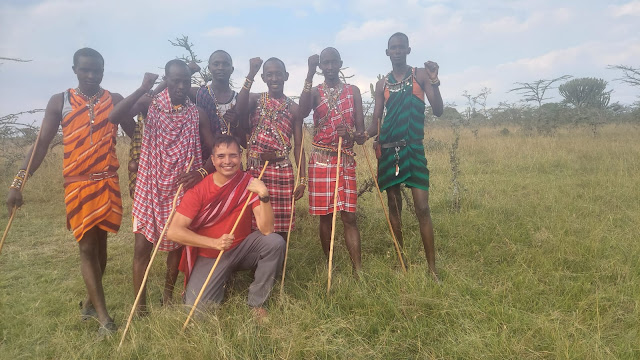The color scheme of the building outside looks like
Starbucks. Someone back home asked me, “aren’t you worried about a lawsuit?” I
am not. I reassure them that Starbucks will not be coming to Mwanza for at
least 100 years. I’m joking of course, but there are no US chain stores here.
We are on the frontier.
My Maasai friend Nic grew up in a mud hut. He has now opened the newest Western style café in town. There is smooth jazz playing inside, the color scheme is modern and slightly subdued. The lighting is soft, and you instantly feel relaxed as you inhale the welcoming aroma of coffee brewing from his imported espresso machine. This is a far cry from anything that can be found in his village near the Serengeti and frankly it is unique compared to the many loud cafes that all serve the same stuff here in Mwanza. Nic also found an expat lady that makes European style scones and American brownies, both of which are rarities here. Already, a loyal customer base is beginning to develop.
It was not easy getting where we are. Our budget got blown, our
opening date got pushed back again and again, and a few people ripped us off.
It was not Nic’s poor planning. It is just hard to start a business in Tanzania.
The local government offices solicited us for bribes on multiple occasions,
some of which we had to pay in order to move forward. Water, electricity, and
sewer hookups all took longer than expected and cost more too….and don’t forget
the bribes.
The information on the government websites was sometimes wrong, sometimes contradictory, and always confusing. It also didn’t help that Nic is a Maasai. The Maasai people, easily recognizable from their red blanket coverings called shukas, might be loved by foreigners, but here in Tanzania they experience prejudice and racism. I saw this play out on multiple occasions, but Nic kept going anyway. He maintained his patience and integrity, even while my own frustrations often boiled over.
The first time I met Nic (Pukare is his Maasai name), I was
sipping a coffee and reviewing a book on business plans for a small business
course I was getting ready to teach. His English was heavily accented but quite
good. “I like business,” he said. “What is that book about?” And so, I became friends
with a Maasai barista. He was ravenously interested in information about anything
that concerned business. I told him about the 5 Ps of marketing, I explained break-even
analysis, and we talked about the poor customer service in Mwanza that sometimes
insults even the locals. I had Nic watch several business movies, “The Founder,”
“Joy,” and some others. He ate it all up. “I want to start my own café,” he would
tell me. But even in Tanzania, it takes a lot of money to do such a thing.
Fast-forward to a few months later. I meet a pediatric surgeon from the US at a holiday event. She is amazing. She comes to Africa a few times a year to perform life-changing surgical procedures on children. Among our many conversations, she told me that she really wanted to invest in a Tanzanian business. “I might know someone, I replied.” And that is how it started.*
I’ve been to Nic’s village. I helped his 12-year-old half-brother get surgery on some severe burns to his torso and hip that had rubberized. He can now walk pain free. I’ve herded goats and cattle near the Serengeti, and I’ve dug up roots for medicine and picked herbs for cooking. I brushed my teeth with a twig and bathed naked in a creek where Lions roam. The Maasai warriors found out I was a former Marine (a warrior). They carry spears, I carried an M4 rifle. We became fast friends as I fell in love with the culture. Did you know that the Maasai was the only East Africa Tribe that never sold human beings into slavery? To this day, they comport themselves in a way that is almost regal.
We did it. My friend owns a café. It is doing well, and it will
get even better with time. He loves running it and he wants to make it even bigger
and more amazing. He feels a lot of pride about the business. He calls it, “Beyond
Café.” It is so titled because he wants to go beyond what anyone has ever
imagined for him. Not only will this business be a ticket into the small middle-class
of a country where most people live on less than two dollars per day, but it will
change the lives of the people he cares about. He can pay tuition for young
family members; he will pay for the medical care of the older ones. I’ve been a
benefactor for ONE. He will be benefactor for hundreds.
I would be remiss if I didn’t remark on Nic’s faith. He prays every morning, and he is grateful for every good thing that has happened to him. And he prays that every bad thing will help him become wiser and stronger. He fasts. He is earnest. And I’ve learned from him in many other ways as well. I might’ve taught him how to calculate profit margin on an Excel spreadsheet. In turn, he has taught me that there is much more to business than profit margin. Among Tribal people in Africa, wealth is not measured by how much you accumulate, rather it is measured by how many people you are able to help with what you have. I think we can all learn from that one.
* Several other people have invested or made donations that were critical in helping get this business off the ground. The saying about teaching a man to fish is true. But what is also true is that none of that matters unless he can afford a fishing pole in the first place.





























